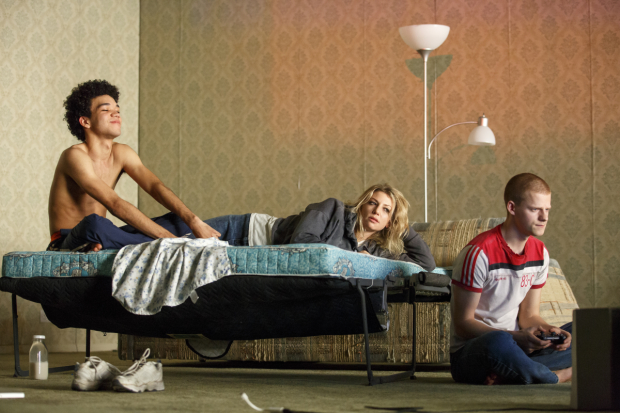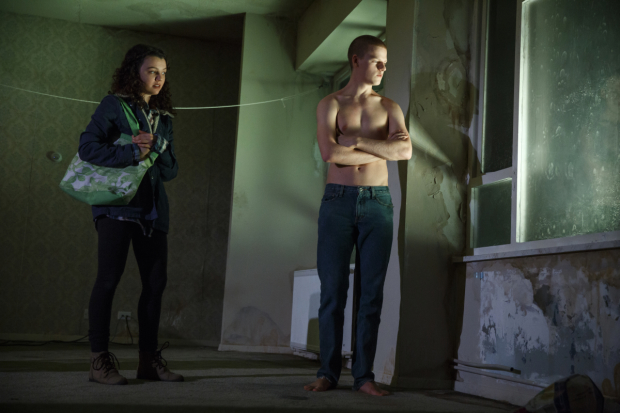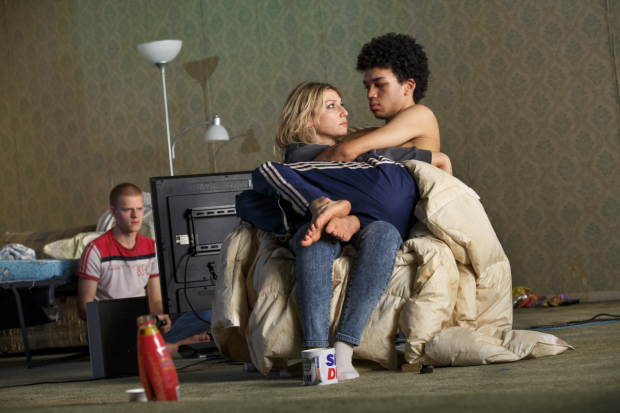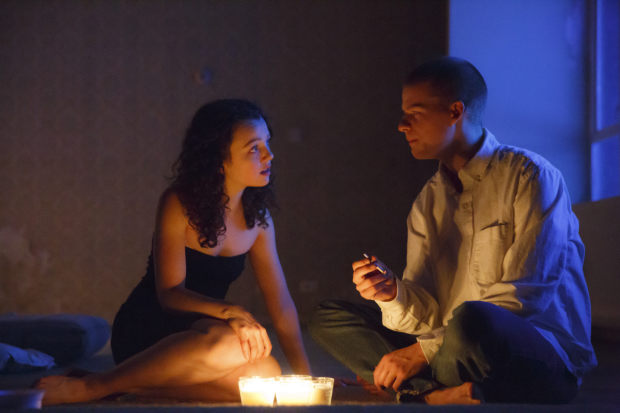Yen

(© Joan Marcus)
It is an unspoken rule of stage and screen than you can depict terrible, awful violence without scandalizing your audience — as long as it is not directed against someone's pet. Accordingly, the image of an Alsatian dog being yanked by the collar on the program cover of Anna Jordan's Yen doesn't bode well for those looking for a 21st-century spin on A.R. Gurney's Sylvia. This U.S. debut with MCC at the Lucille Lortel Theatre is not a nice, polite, play; nor does it need to be. But it is difficult not to conclude that some of Jordan's more spectacularly violent flourishes are tacked on for shock value. Rather than heightening the dramatic experience, they detract from an otherwise very thoughtful work. They are also not particularly original.
Yen is just the latest in a long line of British plays examining the depraved lives of people dwelling in council estates (British for "housing projects"). The most notable example is Edward Bond's Saved, which luridly depicts the stoning of an infant in a carriage. This genre always had a whiff of exploitation about it, with a mostly middle-class audience gasping in horror at sensational depictions of poor people behaving badly, most of these conjured by playwrights who never spent much time around actual poor people. Unfortunately, Yen falls back on such familiar tropes.

(© Joan Marcus)
The first image we see is two bare-chested teenage boys sitting on a sofa bed, languidly watching hardcore porn: Hench (Lucas Hedges) and Bobbie (Justice Smith) are half brothers living in their mother's depressingly empty council flat. They rarely leave, opting instead to pull the blinds and play hours of shooter video games. Beyond a handful of expensive electronics, they have few worldly possessions: In the first few scenes they share a T-shirt, owning just one between them (apparently Granny took the wash to her boyfriend's place and never came back). Meanwhile, they keep their dog, Taliban, locked up and starving in a bedroom. When their mother, Maggie (Ari Graynor), does come around, she is usually drunk and on the verge of a diabetic coma. Their routine is upended by the arrival of Jennifer (Stefania LaVie Owen), a neighbor girl who is worried about the dog. A missionary of decency, she is able to inch into their savage world and, we hope, change their lives for the better.
After getting in our faces with gritty (and dubious) social realism, by the middle of her play Jordan surprises us with a very human drama: We come to really love and care about her characters. With the exception of Maggie, who Graynor plays with a perfectly toxic combination of aggression and self-pity, they're all just kids. They are feeling their way into the world, not yet fully acquainted with its cruelty. Director Trip Cullman presents this story with clarity and sensitivity, aided by some truly remarkable acting.
As the younger Bobbie, Smith gives one of the most electric performances of the season as he fully embodies the erratic and dangerous energy of adolescence. He oscillates wildly between foulmouthed gangster-posturing and boyish glee: He squeals and bounces off the walls, especially when mom visits, nuzzling into her arms like a puppy. This might seem odd since his character is 14, but we get the sense that Bobbie's stunted maturity isn't just about the lack of adult supervision.
Hedges (who is an Oscar nominee for Manchester by the Sea) is far more sober in his portrayal of Hench, who is deep in the thick of the outward emotional numbness that is the hallmark of being a 16-year-old boy. Still, the ever-patient Jennifer is able to crack his stony veneer. This is especially believable from the doe-eyed and unfailingly sweet Owen. Jennifer shares that her father used to call her Yen, which is a rarely used verb meaning to long for something. Everyone in this play yens mightily.

(© Joan Marcus)
Of course, one could cynically read the title as a suggestion that what they long for most is money — that none of this would be possible without glaring economic inequality. Of course, this conclusion is much harder to swallow from an American perspective: This family's benefits seem downright lavish when compared to our own meager welfare system. Those who spend their nights in a "cozy" New York City apartment will have to resist the urge to mentally redecorate Hench and Bobbie's spacious council flat.
Despite the set's large size, Mark Wendland convincingly fashions this public-housing unit with peeling wallpaper and stained ceilings. Its depth actually helps emphasize its emptiness. Lighting designer Ben Stanton regularly illuminates Hench's expression-free face with the anemic glow of the flat-screen TV that constitutes the center of family life. We occasionally hear the bark of Taliban from the other room (unusually tinny work from the usually excellent Fitz Patton). J. David Brimmer's stage violence is shockingly realistic, even when some of the actions the script requires are absurd. Projection designer Lucy Mackinnon bombards us with grotesque, heaving images of barking dogs and violent video games during the scene transitions to keep our stomachs churning.

(© Joan Marcus)
It all seems calibrated to disturb and we can see the calculation coming, making Yen something of a disappointment. Throughout the play, Jordan proves herself to have a firm grip on both contemporary language and timeless human behavior: She acutely understands the value of a little kindness and also the self-sabotage that is fear. Unfortunately, she cannot resist the siren call of sensationalism, which has been the bread and butter of so many British playwrights over the last 60 years. She doesn't need it for us to really care about her work.











